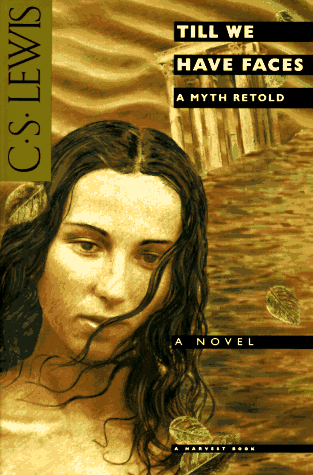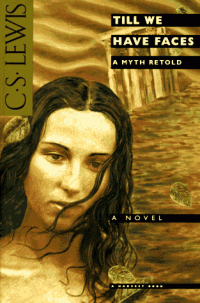 Till We Have Faces
Till We Have Faces is my favorite novel by C. S. Lewis. He wrote that it was his favorite as well, though when the book came out, it was not well received by the public, and never gained much notoriety. Even today, few people even know that he wrote the book.
I think that part of the problem is that even among those who have read the book, few understand what it is about. I am by no means a C. S. Lewis expert, but as I try to read through other things that C. S. Lewis has written, I have stumbled across some statement by him about this book, which I think sheds some light on its meaning.
Let me attempt to share this meaning with you, without destroying the plot of the book too much.
The book tells the story of three princesses, Orual, Redival, and Psyche. As their father the King had no sons, Orual was destined to become Queen, but she was very ugly. Redival, the middle sister, was beautiful, but was also lascivious and vain. However, the third sister, Psyche, was blessed the beauty and the temperament of the gods. She was not only beautiful, but was wise and kind. I cannot really tell much else about story without ruining it, except maybe to say that after much pain, tragedy, and betrayal, Orual becomes Queen and rules for many years.
Near the end of her life, she writes a complaint against the gods. She claims that though she has done nothing but serve and honor them her entire life, they have given nothing in return but pain, grief, and destruction. She recognizes that she is powerless before them, but she feels that if there is one thing she can do against them, it is to make her complaint known by writing it in a book, and making it available for people everywhere to read. That book is the first part of C. S. Lewis’ Till We Have Faces.
But after she finished writing her complaint, she is given a vision. A vision of her life. A vision of her life replayed, but not from her perspective, but from the divine perspective, the perspective of the gods. It is they who saw the entire picture, while she saw only her small part. And this vision shows her that she has been wrong in her anger, and hatred, and bitterness toward the gods. It was not they who treated her so wrongly, but she who treated others wrongly. It was not they who were punishing her and destroying her life, but it was her own actions and behavior that brought pain upon herself.
But even then, the gods took her actions, which had caused so much pain for so many people, and used them to accomplish good in the lives of others, especially those of others that she dearly loved.
When she learned all this, she wrote a second book, which she concludes with the following statement:
I ended my first book with the words “no answer.” I know now, Lord, why you utter no answer. You are yourself the answer. Before your face questions die away. What other answer would suffice? Only words, words; to be led out to battle against other words. Long did I hate you, long did I fear you. I might–
And with that, she died.
Here, I think, is the message of the book: We do not have faces until God makes one for us, and this He will only do by forming one from the garbage of our own lives. Until we learn to see ourselves clearly for who we really are, we see nothing clearly at all. In this book, Orual is brought face to face with herself, and hates what she sees. But it is only after she sees her soul’s twisted face that she is given a new face, a beautiful, shining, radiant face of the gods. The most critical statement in the book is this one:
I saw well why the gods do not speak to us openly, nor let us answer. Till the word can be dug out of us, why should they hear the babble that we think we mean? How can they meet us face to face till we have faces? (p. 294).
Here are a few other quotes from the book which opened my mind in wonder:
For all I can tell, the only difference [between reality and a dream] is that what many see we call a real thing, and what only one sees we call a dream. But things that many see may have no taste or moment in them at all, and things that are shown only to one may be spears and water-spouts of truth from the very depth of truth (p. 277).
When she stands on trial before the gods, she has this dialogue with another person who is there:
“I cannot hope for mercy.” [Orual]
“Infinite hopes–and fears–may both be yours. Be sure that, whatever else you may get, you will not get justice.” [The Fox]
“Are the gods not just?” [Orual]
“Oh, no, child. What would become of us if they were?” [The Fox] (p. 297).
It is quotes like this from a master story-teller like C. S. Lewis which makes Till We Have Faces such a great book.




Wow. I actually haven’t read this one yet….I’m intrigued. The only fiction I have read is (of course) the Chronicles of Narnia (my introduction to Lewis at 8 yrs old), The Great Divorce (good) and Parelandra (very intriguing). Noe this one is added…
Hmm…like I said in my last post, the goal is that gut-wrenching, freeing, terrifying, wonderful stripped bare honesty before God. That is where freedom lies.
It’s my favorite of his too!!!
I think those who read it really like it. It is just not very well known.
Thanks for sharing this. I just ordered it. I will post back to you once I have finished.
Cindy, I am looking forward to what you think about it!
The original Sam says: I need someone to explain to me how to include a yellow smiley face in my comments (using both a PC and a Mac), so I can post a row of them as the comment on this post. I know there is someone reading who will understand what that might mean.
Type a colon, :, a dash -, then a right bracket ), seperate each set wit a space… 🙂 🙂 🙂
There are others that can be done too…
: ) = 🙂
; ) = 😉
: P = 😛
: o = 😮
: D = 😀
: ( = 🙁
8 O = 😯
: ? = 😕
8 ) = 8)
: x = 😡
: | = 😐
: oops : = 😳
: lol : = 😆
: cry : = 😥
: evil : = 👿
: twisted : = 😈
: roll : = 🙄
: ! : = ❗
: ? : = ❓
: idea : = 💡
: arrow : = ➡
: mrgreen : =
Hey Jeremy … I read this years and years ago and I love it to this day. It is so much my favorite from the master. Never quite gained the press of Narnia or Silent Planet, but that’s okay 😉
This has been my favorite Lewis book for a long time. I’m glad your giving it some bandwidth.
If you’re wondering what she was going to write when she said, “Long did i hate you, long did i fear you. I might -”
Think about it. She doesnt hate or fear the gods anymore. “I might-“….
LOVE YOU.
Even cooler?
Look at the last written part in brackets by the priest. He says that ink was on her face after she died.
She had “LOVE YOU” backwards, on the one thing she hates most about herself.
Her face.
But hey. this is just a theory.
Wow. I really like that! I am going to pull the book back out and look at it again.
Funny how I found this page I got a fortune out of a fortune cookie and it’s said God gives you a face but you go after many other faces I didn’t quite get it so I look the quote up and it put me at this page I will have to look into that book. So simple the meaning guess not was just trying to go too deep with it.
Yes, indeed, this is in some ways his finest single work (though one single work cannot surpass the cumulative genius of the Chronicles). Your analysis is spot on, though I also see a deep exploration of the nature of faith. Orual cannot see the palace, though she does for the briefest of moments, yet does not allow that vision to ever change her. The invisibility of the palace was the main detail that Lewis changed from the original story, so I see it as significant. The juxtaposition of Psyche’s joy in the palace and Orual’s horror that Psyche is so happy being in a palace that Orual cannot see, and then Orual’s desperate measures to extricate Psyche from the happiness that Orual does not understand–all of that invites much thought about the nature of faith, and the fact that those who do not believe often see it as their mission to dismantle the faith that others hold (supposedly for their own good) serves as a powerful analogy in the story. I could not put this one down. Lewis was a genius at weaving supernatural truths into intriguing fictional stories. He, like no one else, could masterfully use pagan imagery to teach of the true God.
Pagan imagery to teach about truth…
The boundaries of my scruples keep getting pushed and squeezed. I have so much more grace and understanding for other people and their sufferings and more love for freedom in my walk and I love it. Again here is something that pushes me into the intensely uncomfortable place of seeing it playing out in my life and desperately trying to keep myself within the range of upright and honoring God. How do I work through this? I aim to know the truth and to please God.
Hi Jeremy!
I am choose your article for my college English class, and I have to establish credibility from my author. For that, my professor needs to know what degrees were acquired.
I wanted to ask you what were the degrees you received from Moody Bible Institute and Dallas Theological Seminary.
Thank You!